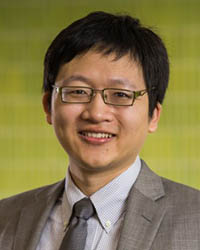Catherine Zandonella, Office of the Dean for Research
Nine exploratory projects, from an effort to exploit inter-microbial warfare in the search for new antibiotics to the development of artificial intelligence for the transcription of ancient documents, have been selected to receive support through the Dean for Research Innovation Funds.
The new initiatives, spanning the natural sciences, humanities and collaborations with industry, are in the early stages of investigation — a time when it is typically difficult to find sources of research funding. To kick-start promising ideas, the Dean for Research Innovation Fund, now in its eighth year, provides the fuel that enables research to blaze new trails.
Funds have been awarded from three classes of projects: New ideas in the natural sciences, new ideas in the humanities and new industrial collaborations.
Within the new industrial collaborations class, two projects on energy and the environment have been selected for funding. This fund supports collaborations between scientists in industry and at Princeton, and it requires a pledge of matching funding from the company in the second year.
 Boosting the energy efficiency of today’s technologies
Boosting the energy efficiency of today’s technologies
A collaboration with EnaChip, a New Jersey-based semiconductor energy startup, aims to shrink the size and improve the energy efficiency of telecommunications, computing and power electronics systems. The expansion of data centers, cloud computing, artificial intelligence and the switch to 5G cellular communications, which draws three times more electricity than 4G networks, is driving massive increases in energy usage. Minjie Chen, assistant professor of electrical and computer engineering and the Andlinger Center for Energy and the Environment, has developed a systematic approach to reduce the size of the electronics delivering power to integrated circuits and microprocessors, and greatly reduce energy loss, enabling more compact and energy efficient systems. Chen will collaborate with EnaChip Inc. to evaluate a new system involving the company’s unique silicon integrated magnetic components and packaging techniques. The collaboration will garner input on how to deploy this new technology from industry partners including Google, Intel, and pSemi Corporation.
 Detoxifying persistent chemicals
Detoxifying persistent chemicals
Through a collaboration with a leading chemical company, the Chemours Company, researchers at Princeton will explore a promising mechanism for breaking down long-lived contaminants in wastewater treatment plants. Per- and polyfluoroalkyl substances (PFAS), which may have human health implications, contain carbon-fluorine bonds, which are some of the strongest chemical bonds in nature. Peter Jaffé, the William L. Knapp ’47 Professor of Civil Engineering and a professor of civil and environmental engineering and associated faculty of the Andlinger Center, and his team have recently shown that a species of bacterium can break the carbon-fluorine bond and biodegrade PFAS. PFAS are commonly found in biosolids from domestic and industrial wastewater treatment plants, and removing PFAS from these biosolids would benefit the environment. Jaffé will collaborate with The Chemours Company to investigate conditions under which bacteria can break down PFAS in biosolids. The Chemours Company is a chemistry company that spun out of DuPont. The company has expertise in advanced materials, having commercialized brands like Teflon, as well as interests in environmental remediation, infrastructure, and the clean energy transition.
The full story originally appeared on the Princeton Innovation website.